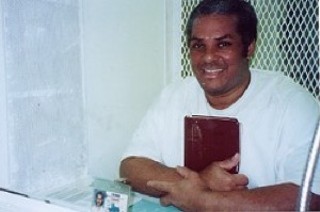Banks Gets Life
But is he guilty?
By Jordan Smith, 9:52AM, Tue. Aug. 7, 2012

More than three decades after he was sent to death row, Delma Banks, Jr. has agreed to accept a life sentence for the 1980 slaying of acquaintance Richard Whitehead – a murder he has long maintained he did not commit.
Banks, who is black, was convicted by an all-white jury of the slaying of 16-year-old, white, Whitehead near Nash, Texas, in April 1980. Banks was one of the last to see Whitehead alive and the state maintained that Banks killed Whitehead in order to steal his car so that he could get to Dallas. There were scant facts to back up this theory, however, and the case against Banks relied almost exclusively on testimony from two men, Charles Cook and Robert Farr – both of whom later recanted their testimony that inculpated Banks. Cook testified that he met Banks in Dallas when Banks drove to his house in Whitehead's car; Farr testified that Banks had asked him to go to Dallas with him to purchase a gun. As it turns out, Farr was an informant paid by a Bowie County sheriff's deputy to get a gun from Banks, and prosecutors coached Cook extensively, shaping details of his story before he testified. Neither circumstance was disclosed to Banks' defense and in 2004 the U.S. Supreme Court overturned Banks' death sentence, opining that the state had withheld key evidence, and chastising prosecutors for their insistence that it was Banks' responsibility to ferret out evidence that the prosecutors had withheld evidence and not the state's duty to disclose the information in the first place, or, later, to correct the record. "A rule thus declaring 'prosecutor may hide, defendant must seek' is not tenable in a system constitutionally bound to accord defendants due process," Justice Ruth Bader Ginsburg wrote for the 7-2 majority.
Since then Banks' case has been languishing in Bowie County – or it had been until last month when the state agreed to take death off the table (the original prosecutor had been adamant that he would send Banks back to death row), and Banks agreed to accept a sentence of life in prison with the possibility of parole, with credit for time served beginning after the Supremes' decision. That means he does not get credit for the 24 years he previously served; Banks will not be eligible for parole until February 2024.
Moreover, as part of the agreed disposition, Banks has given up not only his right to any future appeals, but also forfeits his right to seek clemency. Banks "has discussed this matter with his attorneys on several occasions, and has been fully informed as to what it means to waive his right to seek clemency," reads the agreement. "With the exception of Mr. Banks becoming parole eligible in...2024, it is the intent of the parties that the conviction and sentence in this matter are final and will not be subjected to collateral attack."
The case had been subject to a gag order and Banks' attorney, George Kendall, declined to comment on the case disposition.
While the resolution may bring so closure to the Whitehead family, since, as part of the agreed disposition, Banks "agrees to waive any and all legal challenges to his 1980 conviction for which he takes responsibility," there remain many questions in the case – not the least of which is whether Whitehead's killer is actually still out there – and no one out there looking for answers.
You can find background on Banks case here. Find reporting on the Supreme Court oral argument here. And more on the Supremes' ruling is here.
Got something to say on the subject? Send a letter to the editor.
A note to readers: Bold and uncensored, The Austin Chronicle has been Austin’s independent news source for over 40 years, expressing the community’s political and environmental concerns and supporting its active cultural scene. Now more than ever, we need your support to continue supplying Austin with independent, free press. If real news is important to you, please consider making a donation of $5, $10 or whatever you can afford, to help keep our journalism on stands.
Jordan Smith, Oct. 4, 2013
Jordan Smith, Aug. 9, 2013
May 22, 2014
Delma Banks, Richard Whitehead, George Kendall, courts, death penalty, Legislature, capital punishment, wrongful conviction










